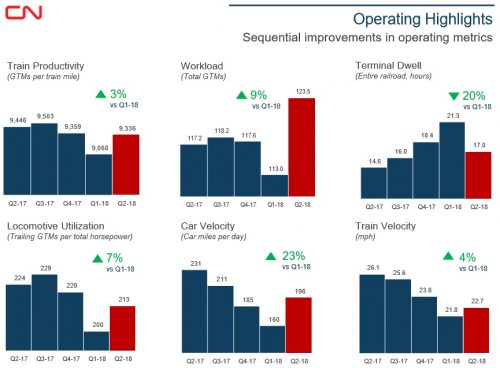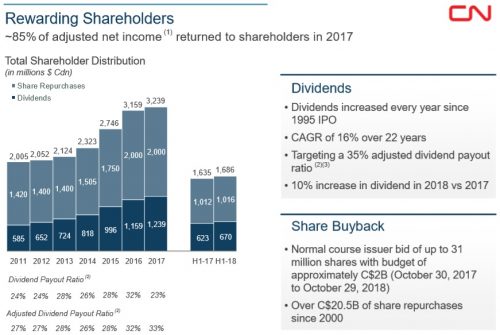U.S. investors tend to focus on domestic stocks, but it would be worthwhile to consider stocks located in our neighbor to the North. The S&P/TSX 60 is a stock market index of the 60 largest companies that trade on the Toronto Stock Exchange. Canadian stocks can offer diversification benefits, as well as unique opportunities that might not exist within the U.S. stock market.
Canadian National Railway Company (NYSE:CNI) is a great example of a stock that might fly under the radar of U.S. investors, but has caught the attention of a very well-known investor. Bill Gates, one of the richest people in the world, owns over 17 million shares of Canadian National Railway through the Bill & Melinda Gates Foundation. This amounts to a $1.4 billion investment in the company.
Canadian National Railway is a growth company, and its shareholders benefit from this growth with strong dividend increases each year. This makes CNI an attractive stock for dividend growth investors looking to diversify outside the United States.
Getting Back On Track
Canadian National Railway is the only transcontinental railway in North America. It has a massive network, consisting of 19,600 miles of rail that spans Canada and the U.S., while connecting three coasts: the Atlantic, the Pacific, and the Gulf of Mexico. The company offers a full range of services including rail, intermodal, trucking, warehousing, and distribution. It benefits from a diverse portfolio, in terms of geography, products, and customers.

Source: Investor Presentation, page 10
CNI’s operational strategies have worked very well for the past several years. For example, from 2011 through 2017 the company grew revenue and adjusted earnings-per-share by 6% and 13% per year, respectively.
However, things don’t always go smoothly for CNI. As a major railway, CNI is in many ways a bellwether for the broader economy. It has customers in virtually every industry, which means CNI is impacted by recessions and severe downturns in any specific industrial category. The past few years have been characterized by especially difficult conditions in the coal industry. Coal is a significant product for CNI, and as a result the company has not been immune to the downturn. This is why company revenue declined by 4.6% in 2016.
Conditions turned more challenging once again in the 2018 first quarter, due to harsh winter weather, but CNI quickly bounced back with a strong performance in the second quarter. Revenue increased by 8% in the second quarter, year over year, while adjusted earnings-per-share increased 13%. CNI saw recovery across a multitude of key operational metrics in the second quarter, compared with the 2018 first quarter.

Source: Earnings Presentation, page 7
Revenue increased across product categories, including 12% growth in petroleum and chemicals; 12% growth in grain and fertilizers; 15% growth in metals and minerals; 39% growth in coal; 6% growth in intermodal; and 6% growth in forest products. Increases were due to higher volumes, as well as higher freight rates.
CNI is benefiting from the continued global economic recovery. In addition, the bottom line is seeing a boost from cost reductions and tax reform. Add it all up, and CNI’s earnings growth outlook remains quite strong. Following CNI’s strong performance in the second quarter, the company raised its guidance for the full year. It now expects adjusted earnings-per-share in a range of $4.02 to $4.14 per share. This would represent 6.2% to 9.2% growth from 2017.
Transporting Cash to Shareholders
CNI runs like a well-oiled machine. The company generates a great deal of free cash flow, thanks to its operational efficiency and strong growth. CNI had a return on invested capital (ROIC) of 15.9% in 2017, which indicates that the management team is effective at allocating capital. Shareholders are natural beneficiaries of this, as CNI returns a great deal of cash to its investors. The company returned approximately 85% of net income to shareholders in 2017 through dividends and buybacks, and has increased its dividend each year since its initial public offering in 1995.

Source: Investor Presentation, page 47
CNI maintains a target dividend payout ratio of 35%, which leaves plenty of room for continued dividend increases of 10%+ each year, barring a major economic downturn. Another factor helping to secure CNI’s dividend and boost its dividend growth potential is the company’s strong balance sheet. CNI maintains a debt-to-EBITDA ratio of 1.93x, which means it has a manageable level of debt. CNI also has a strong credit rating of ‘A’ from Standard & Poor’s, which will help reduce its cost of capital.
Investing in companies based outside the U.S. carries unique considerations for U.S. investors. First is the effect of currency translations. Since CNI pays its dividend in Canadian currency, the amount of dividends received by U.S. investors will vary, depending on prevailing exchange rates. The company currently pays an annualized dividend of CAD 1.82 per share, which translates to $1.38 per share in U.S. dollars. This results in a current dividend yield of 1.6%. While CNI has a relatively low dividend yield, it increases its dividend at a high rate. In the past five years, the company grew its dividend by 16% per year on average, including a 10% dividend increase for 2018.
Another important consideration for investing in foreign companies is withholding taxes. Dividends received in Canadian dollars are typically subject to a 25% withholding tax. However, there is an exception for Canadian stocks – the withholding tax is waived for U.S. investors who hold the stock in a qualified retirement account, such as a 401(k) or IRA.
Final Thoughts
CNI has a dominant market position, and counts one of the world’s richest people among its largest shareholders. The company has rewarded shareholders over the past several years, and should continue to do so over the long-term. While CNI would not be immune if another recession were to occur, the long-term prospects remain strong. CNI isn’t the cheapest stock around, as it trades for 21 times this year’s expected earnings. But premium businesses often command premium valuations, and CNI’s stock valuation is more than justified given its strong business model and growth potential. CNI is an attractive stock for dividend growth investors.
